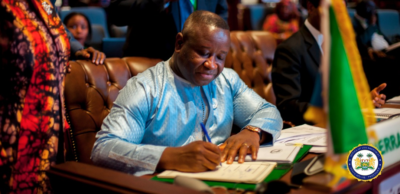
Sierra Leone Telegraph: 24 October 2018:
Early this year, just three months after he was elected Head of State, president Julius Maada Bio took a decision to dissolve the Boards of all state-appointed Commissions, parastatals and other state institutions, as he considered many of them to be unaccountable, self-serving and a huge drain on the government’s declining revenue.
But this decision has proven to be quite controversial and has drawn criticisms far beyond the opposition political parties, who say that president Bio’s decision contravenes due process and the rule of law.
Many have even gone further to accuse the president of abusing the country’s Constitution – no difference from the former president Ernest Bai Koroma, they say.

Since then, a few of the state-appointed Boards have controversially been given the green light to function again, including the Independent Media Commission (IMC), and the Commision for Privatisation which is headed by the secretary general of president Bio’s SLPP party.
Last week – 16 October 2018, the Chairperson – Professor Dr Beate Rudolf of the Global Alliance of National Human Rights Institutions (GANHRI), which is the United Nations (UN) recognised global umbrella body of national human rights institutions (NHRIs), wrote a letter to the Attorney General and Minister of Justice of Sierra Leone – Dr. Priscilla Schwartz, to raise serious concerns about the “dismissal of Commissioners of the Human Rights Commission of Sierra Leone”.
This is what the letter says:
Your Excellency Attorney General, I am writing in my capacity as Chairperson of the Global Alliance of National Human Rights Institutions (GANHRI), which is the United Nations (UN) recognised global umbrella body of national human rights institutions (NHRIs).
GANHRI represents at an international level over 110 NHRIs from around the globe, 79 of which enjoy accreditation in full compliance with the United Nations Paris Principles, testifying their full compliance with the Paris Principles (“A status”).
It has been brought to my attention that the Commissioners of the Human Rights Commission of Sierra Leone (HRCSL) were dismissed from office by virtue of a public notice issued on 26th June 2018, which dissolved all oversight boards, parastatals and other state institutions.
I understand that this dissolution does not specifically target the HRCSL as the notice applies to all but five independent entities.
I note that the HRCSL has formally inquired with the Office of Secretary to the President and the Attorney General and Minister of Justice as to why the HRCSL, as the independent and ‘A’ status accredited NHRI of Sierra Leone, was not exempted from the public notice, but that the responses received did not clarify the issues raised by the HRCSL.
While Governments are, of course, free to pursue reforms that they consider necessary, GANHRI considers that observance of the rule of law is paramount. Any actions must be in conformity with the law, including due process.
I understand that the Government has already begun the process of appointing new Commissioners, while the current Commissioners have to date not received a formal note of dismissal.
The HRCSL is a member of GANHRI and has been accredited with ‘A’ status in full compliance with the Paris Principles since 2011.
Guarantee and security of tenure of members of the decision-making body of the NHRI are interrelated core guarantees for the independence good functioning of an NHRI in the service of the human rights of the population, in line with the Paris Principles.
The GANHRI Sub-Committee on Accreditation (SCA), the UN-recognised body mandated to review the compliance of NHRIs with the UN Paris Principles has specified that:
– Members of a NHRI may be dismissed only on serious grounds of misconduct or incompetence, in accordance with fair procedures ensuring objectivity and impartiality set out in the national law; and
– The dismissal of members by the Executive, such as before the expiry of the term for which they have been appointed, without any specific reasons given to them and without effective functional immunity being available to contest the dismissal, is incompatible with the independence of the NHRI (SCA General Observation 2.1).
I note that the dismissal of the HRCSL Commissioners before expiry of the term for which they have been appointed and without any specific reason and without effective functional immunity being available to contest the dismissal, i.e. without insurance that the reason for dismissal is not an action taken by the NHRI in fulfilment of its mandate, gives rise to concerns that the circumstances of the HRCSL may have changed in a way that may affect its continued compliance with the Paris Principles (Art. 16.2 GANHRI Statute), which would result in its losing its A status.
Against this backdrop, I call on the Government of Sierra Leone to adhere to the established procedures that guarantee the tenure of office for the Commissioners as provided under Section 4(3)G of the 2004 Commission Act and under Section 137 (7) of the 1991 Constitution of Sierra Leone.
I take this opportunity to avail myself or my delegate for a visit to your country to discuss further in person and remain available for any clarifications.
Yours sincerely,
Professor Dr Beate Rudolf
Chairperson, GANHRI, Director, German Institute for Human Rights.
Attachments:
i) Paris Principles; and ii) SCA General Observations.

We now have legally tenable evidence that respect for The Rule of Law, and, proprieties pertinent to most national and local government management and administration under President Bio are lower than those under his predecessor – all to Sierra Leone’s detriment. Sierra Leone’s future prospects in many respects are therefore dim.